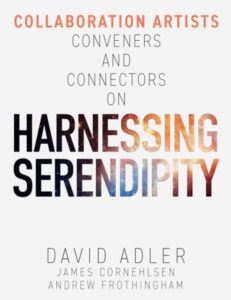Dave Peck is the author of Think Before you Engage, a new book that guides readers through 100 questions to ask before starting a social media marketing campaign. He asked me to write the foreword and as a friend and neighbor, I of course said yes. But, the only condition was that upon publishing, I could share the foreword with you here…
The End of Business as Usual and the Beginning of a New Era of Adaptive Businesses
Twitter, Facebook, Youtube, Yelp, Foursquare, it seems that every day, there’s a new network that is capturing the attention of consumers everywhere. These social networks were once thought to be the playgrounds of the millennial. Now these networks dominate global headlines, changing the way that everyday people connect and communicate with one another. But that’s just the beginning of where this story unfolds. Social networks are fundamentally transforming the way people find and share everything that’s important to them.
Social media democratized information and empowered consumers to take control of not only their online experiences but also those in the real world. As a result, social media is changing how customers shop, refer products and services, and ultimately make decisions. The relationship between customers and business is changing and will continue to evolve as new media permeates our culture and society. What important to understand is that this isn’t a fad nor is any of this going to revert back to the way things used to be. Consumers are connected, entitled, and now expect recognition and value just to get their attention, let alone their business.
How We Got Here
A funny thing happened with social networks. People starting sharing what they think and did so vigorously. While the extent of what people would say about brands, products or services wasn’t highly anticipated, it shouldn’t have come as such a surprise. After all, businesses were subjected to customer opinions online going back to the early days of Web 1.0. With the likes of Amazon.com, epinions, and online peer-to-peer review systems, the voice of the consumer was given a stage and a magnificent theater to cast a spotlight on their experiences and expressions. Fanatical audiences could now come and go at will to hear what anyone and everyone said. More importantly, these audiences were captive, ready to take action based on what individuals had to say specifically related to brand and product decisions they were considering.
The difference between then and now is profound. Social media didn’t invent the ability for customers to share their opinions, but it did amplify them. Consumer reviews are no longer stationary. With the rise of social networks, customer experiences are now portable and actionable. And as customers expanded their personal social networks, their experiences became exponentially influential. Now customers are empowered and connected and their words affect the decisions of their peers in multiple networks. One experience can reside in Yelp, linger in FourSquare, make the rounds in Facebook and Twitter, and come to life as a lasting record of events in blogs and YouTube. And because of the viral nature of social media, the ability to affect decisions is potentially infinite.
Social media is as intimidating as it is encouraging. Not only does it work for customers, but it also empowers businesses to learn from customer sentiment and adapt to their wants and needs. Social media is a window to relevance and the ability to compete for the future, today.
The Sky Is Not Falling, It Rains with Opportunity
I remember the early days of Yelp and the backlash that erupted among business owners outraged at the ability for customers to share negative experiences. The anger intensified as consumers flocked to the network en masse. “People will stop coming to our establishment,” businesses would exclaim. “Customers are going to be swayed by the bad things some of our customers are saying,” others feared.
To this day, I still have only one word to say in response, “exactly.”
Customers are now front and center of the business owner, forever changing how businesses think about the people they serve and why they deserve their support.
Social networks do not represent the end of your business. They do however symbolize the beginning of the end of business as usual. This is where your journey begins. It’s not about fearing the ability for customers to share what’s wrong; it’s about building relationships and delivering meaningful experiences that inspire customers to share their take on why you are amazing.
Great experiences not only engender loyalty, they serve as the catalysts for attracting new customers. The people who are connected to your customers will take action based on what they say. This is the promise and opportunity of social media.
Your customers now feel a sense of ownership in the businesses they support. As a result, you’ve now inherited a potent marketing force that pays for the privilege of doing business with you and in turn, tells the world why.
I believe you are holding this book because you recognize that your customers are becoming more important to your business with every new connection they make. With this book, David Peck is handing you the keys to open the doors to social media and vibrant business opportunities. By engaging your connected customers, you by default, become connected. Doing so shapes and reshapes online and offline experiences, bringing small businesses and local establishments to life in popular and incredibly active digital domains.
The reality of business is that customer experiences will either be positive or negative. The good news is, these experiences are yours to define. What they encounter and what they share within their networks is directly tied to your intentions, your investment in products and services, and the means used to deliver happiness and guarantee satisfaction.
Social media aside, the future of business is about improving relationships and customer experiences. By asking the right questions, making informed decisions and using readily available tools, even the smallest business can be successful at engaging online.
This is your time to not just react to customer activity in social networks, but create remarkable experiences that foster meaningful relationships. This is your time to lead, not follow.
Your customers are waiting.
Connect with Brian Solis on Twitter | LinkedIn | Facebook | Google+






NIce post!
It is amazing that in the past five years business has changed so much. Social media used to be something that we would use to interact with our friends and have fun, now it is something that we use to do business. I am looking forward to the changes that will come in the future years as well.
It’s only just the beginning Brianne! It’s up to us to define where it goes from here. Cheers!
awesome post i loved it a lot
I enjoyed reading your article.
I work for a leading UK retailer and yes they use social media extremely well as a marketing tool.
They also use it as a recruitment tool. Not content with the interview, team building exercise and presentatiom processes they view the candidates social media profiles prior to making their final decision. They have said since using this indicatorboth their labour turnover and absence stats have dramatically improved.